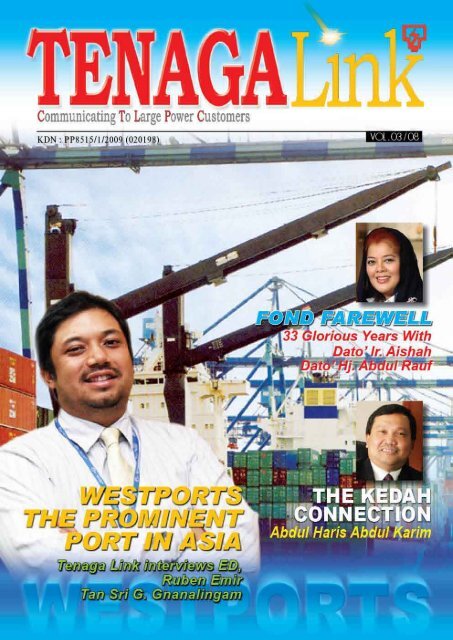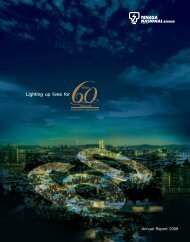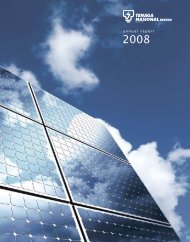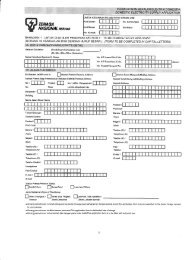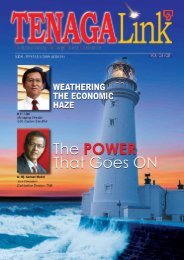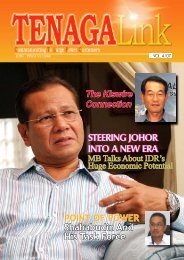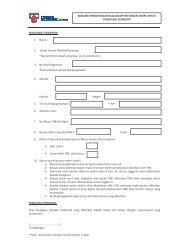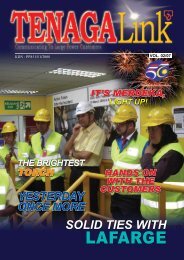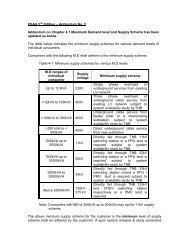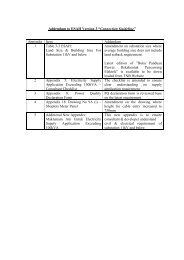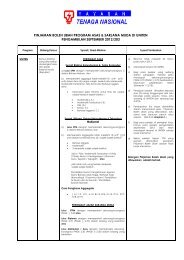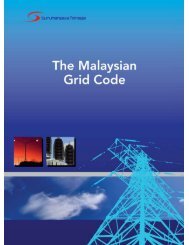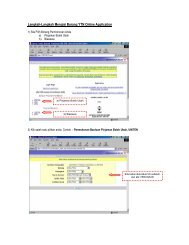S In At - Tenaga Nasional Berhad
S In At - Tenaga Nasional Berhad
S In At - Tenaga Nasional Berhad
You also want an ePaper? Increase the reach of your titles
YUMPU automatically turns print PDFs into web optimized ePapers that Google loves.
<strong>In</strong>deed, when Dato’ Ir. Aishah Dato’ Hj. Abdul Raufretired, she did more than what she actually setout to do. As she bows out, this lady will be able tohold her head up high and proudly say, “ I did it! ”. Butshe won ’ t. No one will hear her saying this becauseshe would delightfully and selflessly owe all herachievements, awards and accolades she has helpedTNB garner , to her team. That’s Aishah for you, TNB’sshining star with a bright light that warms everyoneshe cares for.SHE was perpetually switched on. Her job required her tobe, literally.As Vice President of <strong>Tenaga</strong> <strong>Nasional</strong> <strong>Berhad</strong>’s DistributionDivision, Dato’ Ir. Aishah Dato’ Hj Abdul Rauf, headed thepublic face of TNB, the closest point of interaction betweencustomers and the utility until her retirement recently.Consequently, she had to be on her toes, sometimes not justthroughout the day, but also at night, right up to the wee hoursof the morning.She was used to 20-hour days, sometimes even longerwhen there were pressing matters to attend to. Even at socialfunctions or events, Aishah remained wired. “<strong>At</strong> high-profilefunctions especially, I get butterflies in my stomach, especiallyif the lights blink,” she smiles.Aishah took everything in her stride, however. Her eversmiling,congenial demeanour belied a steely disposition, honedthrough her years of experience in the utilities company.She knew exactly what she wanted and will worked hard toachieve it. That trait was obvious from her school days.“My ambition then was to be somebody and to go overseasfor my studies. That was what drove me.So when I was offered a scholarship by TNB to studyengineering, it all worked out nicely,” she reminisces.She enjoyed the course in the United Kingdom, eventhough there were not many girls in engineering then. “<strong>In</strong> myuniversity’s honours class, I was the only girl in the class of100.”Upon graduating, she joined the company’s meteringdepartment. “When I started, I didn’t think I would be VP oneday.”But that she did, after serving in various capacities asdistrict engineer, in business operations, marketing, business4management, and manufacturing. Her varied experience andwork exposure abroad gave her a well-rounded perspectiveof what she had to do when she was put in charge of theDistribution Division.“I am grateful to TNB as the company was generous withme. That helped prepare me for the job. I certainly neededthe exposure and preparedness or else it would have beenoverwhelming.”Aishah can now switch off and spend some quietuninterrupted time with family and on other leisurely pursuits.After having spent practically all of her professional life, 33years to be exact, in TNB, Aishah retired on November 14.She left with innumerable achievements to her name afterhaving spent four years in a post just three rungs below theoffice of the President/Chief Executive Officer, and as thehighest placed woman in TNB. <strong>In</strong> the Asian region, she isone of the highest ranking women heading a core section of autility company.The Distribution Division, which is entrusted to conducttwo value chain business activities on behalf of TNB -distribution network operations and electricity retail operations- can proudly point to several achievements logged under herstewardship.All of which was possible as Aishah is quick to point out,without teamwork.“When I started, I remember the CEO saying that Distributionwas crumbling. Four years down the road, we are now a highperformance division. I am very proud of my team.”There are about 16,000 people working under her in thedivision, and they comprise 70 per cent of the entire staffpopulation in TNB. Of this number, there are some 1,500executives, out of which 25 are in the core management team.
able to rev up the completion. This project can also assist in thegovernment’s initiative to ensure energy efficiency.”The changes spearheaded by Aishah managed to successfullyresolve all the fundamental issues.It is, therefore, a wonder that Distribution broke a recordWithout doubt, customer service issomething this woman of substancetakes very seriously. Powerconsultations have been introducedto help Prime customers - the top1,000 or large power customers -identify their problems.of sorts in terms of its Customer Satisfaction <strong>In</strong>dex. For thefirst time since 1994, the division surpassed a “barrier” in theindex, which is carried out by an independent third party.“We always hover below 7, but for 2007/2008, we werevery happy to achieve 7.1. We have moved from a positiondenoting average customer satisfaction in terms of the globalutilities norm to be among the top 33 per cent. This is anManufacturers (FMM), Construction & Cement Associationof Malaysia (C&CA), Federation of Malaysian ConsumerAssociations (FOMCA) to name a few. They tell us what theyare not happy with and we take heed and try to improve onit.”The division has also built a good relationship with theMalaysian <strong>In</strong>dustrial Development Authority or MIDA andhelped in attracting foreign direct investment.As for the other clients, there is a Customer <strong>In</strong>formationSystem beside other channels.“We keep track of what is happening so that we understandthe issues. For example we know the customer walk in volumeat our Kedai <strong>Tenaga</strong>, the telephone-in volume and we alsomonitor the <strong>In</strong>ternet. There is also an Electric Eye for ourstaff to give feedback on the things we should be improvingon. We have also improved on the infrastructure of our CallManagement Centre (CMC) or TNB’s Careline 15454 to caterfor more calls. Customers can now also SMS besides callingin.”It came as no surprise, therefore, when the centre won theGold Award in 2007/2008 for the Most Promising EmergingCall Centre for the government-linked company category.“We are very proud of this. We hope our CMC will be ableachievement which does not happen just like that. It is dueto good teamwork, commitment, initiative, and focus onimproving the reliability of supply,” notes Aishah.Without doubt, customer service is something this woman ofsubstance takes very seriously. Power consultations have beenintroduced to help Prime customers - the top 1,000 or largepower customers - identify their problems. A Care programmeor Corporate Account Relationship Enhancement Programmewas introduced for corporate customers like banks, hotels, fastfood chains and others.“Prime is more on manufacturing and care more for retailbusinesses. We focused on providing a channel for us to hearthe voice of customers and this has taken shape in the form ofdialogues with associations like the Federation of Malaysian6to serve the region one day,” she says.Another much coveted award secured by the division wasISO certification. She admits to having been unsure initiallywhether the division could get the certification.“<strong>At</strong> that time, my team put their heart and soul into it and tomy amazement, we got it,” she enthuses.Power supply reliability, which is tracked by the keyperformance indicator called SAIDI or System Average<strong>In</strong>terruption Duration <strong>In</strong>dex has also improved tremendously.<strong>In</strong> 2004, it was at a level of 152 minutes per customer peryear, but it went down to 148 in 2005, 102 in 2006, and 83 in2007.“We are very happy to have broken the 100 barrier. Thatmakes us comparable with developed countries. For 2008,
Cover StoryA Port To Be Proud OfThe Straits of Malacca is one of the busiestwaterways in the world. Trading ships ladenwith cargo, have been plying the Straits sincethe ancient days of Parameswara as this isthe only way one can connect between Asiaand Europe, and Asia and the Middle East bysea.Even between the US West Coast andAfrica, this would be the fastest route.Among the many ports here, lies one thatis growing in prominence, year by year. Today,Westports handles 5 million TEUs or twentyfoot containers per annum. And the figure isconstantly growing; it has been so since thecompany started operations sometime duringthe Asian crises, and yet managed to increasebusiness by 500 per cent then!Executive Director Ruben Emir Tan SriG. Gnanalingam, 32, gives us a 101 lesson onports, as he sails through our questions, happyto talk shop – or in this case, ship. The answerswe get? As clear as the deep blue sea.Ruben Emir Tan Sri G. GnanalingamExecutive Director<strong>Tenaga</strong> Link: How long has Westportsbeen in the business?Ruben Emir Gnanalingam: Fourteenyears. My dad started it in 1994.Container operations really started in1996.TL: Westports Malaysia has chalkedup so many firsts: Among them; thefirst port in Malaysia to have a fullycomputerisedconventional terminal;the first port in Port Klang to hit 3million TEUs or 20-foot equivalentunits. It boasts having started the firstfully-automated conventional BillingSystem in country. Any other firsts youare particularly proud of?REG: We recently broke two worldrecords in terms of container handling.One record pertains to how many boxesyou can move off a ship in one hour,and the other record relates to howfast we are able to clear all the boxes8from that vessel throughout the vessel’sstay. The speedy handling of cargo isimportant for a shipping line because aship’s purpose is to sail, docking timeshould be at a minimum as the longeryou dock at berth, the more you arewasting precious time. A ship tries tocome in and go out as fast as it can.<strong>In</strong> the same way that an airline wantsto get everyone in and off the planeas fast as they can, we try to help ourcustomers by moving their cargo asfast as we can. So that’s why this worldrecords were important.Other firsts: Westports was the first portto break the 3 million TEU mark in2006. Last year, we achieved 4 million.By the end of 2008, we should have hit5 million TEUs.TL: Any other awards you are proudof?REG: We received one last year forsecurity and safety. And the one we aremost proud of comes from the HumanResource Ministry; The Best EmployerAward last year.TL: How do you rate your port?REG: <strong>In</strong> terms of efficiency, I thinkwe are at par with the best; people likeSingapore, Hong Kong etc. But if youcompare Singapore’s IT team, it’s 500-people strong. Ours comprise 5 guys.We can’t really compare one for onethough, as Singapore is six times biggerthan Westports.TL: Can you tell us about the CMACGM Vela, the latest supersizecontainer ship belonging to Frenchshipping company CMA CGM thatrecently docked at Westports?REG: A supersize vessel is more than10,000 TEUs. The Vela is 11,200 TEUs(meaning you can store as many 20 foot
growth next year though not as high asthe previous years.TL: Can you tell us about your RM800million expansion plan? Will it behampered by the expected economicslowdown?REG: We took up a 15 year loan thisyear, drawn down in phases. Terminal5 was ready early last month. The restof funds will be used for future phases.The economic slowdown will definitelyeffect our expansion plans but we haveinternal triggers; once we hit a certainvolume then we know, that’s the time tobuild. If the triggers come later, then webuild later, it’s just as simple as that.For now we are at 5 million TEUs andour capacity with terminal 5. It mightgrow to 5.3 million TEUs next year,but our capacity now is 7 million, sothere is no immediate need to build fornow. We can take our time.TL: How does Westports rate in theSouth East Asian region, Asian regionand worldwide?REG: There are now 5 major portslocated along the Straits of Malacca -(Westports, Northport, Penang, Port ofTanjung Pelepas, Johor (PTP) and Portof Singapore Authority (PSA)) the mostused waterway since Parameswara andeven before, until today.Fifty per cent of all ships built havepassed the Straits of Malacca, so it’sdefinitely still the busiest waterway inthe world.<strong>In</strong> terms of productivity and efficiency,we are probably ranked number one,in terms of size, PSA is obviously thelargest, PTP is the second and we arethird.<strong>In</strong> terms of location, anyone along theStraits of Malacca is naturally in a good10location. And the good thing about beinghere is that this region is growing veryquickly. For example, in 1995 beforewe started container operations, whenwe were at zero, Port Klang handledjust over 1 TEUs and it was shared withPenang. Back then, Singapore handledmore than 16 million TEUs. Totalmarket in the Straits of Malacca wasabout 18 million TEUs.Today, the market size is about 45million TEUs. The pie has grown bigger.Of this number, Singapore handles about30 million TEUs. We get 5 million, PTPgets 6 million, Northport gets 3 million,Penang is getting about 1 now and so,everyone is growing in this region.As a major waterway, a lot of transithappens here as well, like Singapore’sChangi airport which is like a transitairport; flights from London have tostop there to go to Australia etc, so itbecomes a gateway.TNB services are veryimportant to us becauseour quay cranes run onelectricity. If we don ’ thave electricity , we can ’ trun and I think the way Imeasure <strong>Tenaga</strong> servicesis that we have not hadany power shortages forthe last five years.TL: How important is this “gateway”of Straits of MalaccaREG: Well, there are two routes wherea lot of trade exchanges take place;Asia to US, which affects us minimallybecause there are three routes to the US(one is directly from China or anywherein Asia, straight to Los Angeles. That’spretty straight forward. The second oneis through the Panama Canal; it has togo down pass Mexico, then comes toNew York or Florida or wherever youwant to go. The third one is throughhere, past South East Asia, throughEurope and then across the Altantic toNew York. So we get a small chunk ofthat business).But between Asia and Europe thereis only one way; through the Straits ofMalacca. And between Asia and theMiddle East there is no other way. Andeven between the US West Coast toAfrica, this is the fastest way to go.So, a lot of business happens betweenthese areas and even places that aregrowing very fast like the Middle East;to go to the US, they can go both ways,so we get half of that business as well.And to go to Australia and <strong>In</strong>donesia,you have to pass here too. So, as aresult, there is a lot of traffic movementin the Straits because of this.TL: Who is your main competition?REG: For local Klang Valley businesswe compete with Northport, but whenit comes to Trans-shipment or transitcargo, it’s anyone. <strong>In</strong> this region, we cancompete with Vietnam, <strong>In</strong>donesia, even<strong>In</strong>dia, because we’re talking about theAsia and Europe routes and you needto transit somewhere. And technically, avessel can transit anywhere in between.TL: How does TNB’s services factor inWestports operations?REG: TNB services are very importantto us because our quay cranes run onelectricity. If we don’t have electricity,we can’t run and I think the way Imeasure <strong>Tenaga</strong> services is that wehave not had any power shortages forthe last five years.We don’t have any issues with <strong>Tenaga</strong>,only maybe there’s no more increase inrates (laughs).The quay cranes are located on theberth. If they are not in operations, wecannot handle any of the cargo from theships at all. The cranes move left andright. And they run all day, all night.That’s why the service we get from<strong>Tenaga</strong> is essential and so far there’sbeen no problem. We are very happy,but can be happier if the rates go down(laughs)
OperationsTEAMWORK PAYS OFFA final “Joint <strong>In</strong>spection” was conducted by JPA-Central & AM-Seremban before the full operations of the 30MVA PowerTransformer.The first financial quarter for 2008/2009 kicked offwith much promise and eventual success by the FederalManagement Office (Central), Asset DevelopmentDepartment, Transmission Division (JPA-Central) whentwo 30MVA Transformers were carried out for the <strong>In</strong>creaseTransformer Capacity project in PMU 132/11kV Gemas.The top management of TNB is certainly proud of thisachievement as it is an initiative not only towards TNB’s‘Service Excellent 2010’ but more so for its TransmissionDivision.It was the Transmission On Time with Quality andWithin Budget Project that inspired the JPA-Central projectmanagement team to give their best to the assignment.Through sheer hardwork and team effort between JPA-Central, AM-Seremban, contractor (CDEE-TGV) and testor(Kuasatek), the project was successfully completed on Nov14, a week ahead of schedule.The project was also fully implemented below the costcontract.PMU 132/11kV Gemas requires an increased capacityof Power Transformer in order to meet the increasingdemands within the Gemas district with the expansion ofTuanku Syed Sirajudin Army Camp and Heavea Board woodfactory. These two entities are Large Power Consumers inGemas.The first transformer was operational in mid-August2008 followed by a second transformer on Nov 7, 2008.Congratulations to all the project management teamnamely:-1. Ir. Chan Teck Wei (Federal Manager)2. Irwan Shahri Mat Sohod (Project Manager)3. Ir. Nazarudin Kassim (General Manager – Public)4. Mohd Shafiz Mustapah (Project Engineer)5. Mohd Yazee Mat Yatim (Civil Engineer).11
StatesTNB CELEBRATESHARI RAYA NATIONWIDENo one does it better than TNB when it comes to lighting up your homes. Andit ’ s the same when it comes to celebrating its customers during Hari Raya.Literally speaking, as the nation’sforemost energy and powerprovider, no one can light upyour life as brightly as <strong>Tenaga</strong> <strong>Nasional</strong><strong>Berhad</strong> is able to.Taking this a step further, even in joyous,jubilant festive occasions, there isn’t onecorporation that could hold a candle toTNB in the way this company celebratesits customers, working partners andgovernment representatives, those inneed including orphans, and the lessfortunate.TNB has a special way of lighting upnot just a venue but the hearts of thosedearest to them.This was clearly seen and most evidentat the recent nationwide Hari RayaCelebrations held by one of the country’smost favourite GLC.<strong>In</strong> an effort to bring more joy as itbrightened up the lives of many on thisspecial occasion, TNB, held its HariRaya open house treat in 14 states. Andin some of them, including Perlis, Perakand Kelantan, it was no one less than theSultan himself, who graced the eventswith their royal presence.<strong>In</strong> Penang and Negeri Sembilan, it wasthe Chief Minister and Menteri Besarwho were the VIPs present respectively.Needless to say, this successful do,organised annually with an aim to12bringing the people together, fostercloser ties between TNB and itscustomers, and provide a platform to saythank you to all those who have workedand continue to work with TNB, is a hitevery time and everywhere its held.<strong>At</strong> each avenue, there would always beat least 1,000 guests present, enjoyingthe array of rendang, satay, ketupat,lontong, soto, lemang and othertraditional foodstuff associated withHari Raya, as well as good music bylocal artistes.There was even more cheer all aroundfor the invited orphans, widows andsingle mothers when they received theirang pow packets over and above thefood and festivities of the day.Those present this time around includedCEOs and MDs of TNB’s PrimeCustomers, many of whom came withtheir staff.And at hand to receive them were noneother than TNB’s top managementwho included the Chairman and CEO,VPs, and General Managers of thedifferent states as well as TNB’s head ofdepartments.All in all, one could say that TNB’s HariRaya ‘08 celebrations was a successfulone - yet again - that was lit up withlaughs, friendship and naturally, greatfood and entertainment.
RegionalCall it “ electric ” but thingshave certainly beenlooking up or in this caseyou could say, “ brighter ”for the state of Kedahunder the watchful eyesof General Manager ,Abdul Haris Abdul Karim.The KedahConnectionIt didn’t take long for the managementof <strong>Tenaga</strong> <strong>Nasional</strong> <strong>Berhad</strong> (LLNthen) to recognize the leadershippotential in Abdul Haris Abdul Karim,who today heads TNB Kedah.<strong>In</strong> 1984, he was chosen to head thedistrict of Sitiawan in Perak after onlya two years service. It was a proudmoment for the young rookie and onethat sent him down a checkered path ofbig challenges but bigger rewards.“It was still very early on in mycareer, and here I was heading a ministate office in the district of Sitiawan.It was challenging but I enjoyed theexperience very much,” says the TNBscholar who graduated from the AstonUniversity in Birmingham in 1984.Abdul Haris did not let his superiorsdown. <strong>In</strong> the seven years he was there, heand his team, over saw the developmentof Manjung Port, the electrifying ofPangkor Island and the growth of thedistrict from a small town to a dynamicone.Pangkor Island used to rely on adiesel generator for its electricity needs,which were limited to several hours aday. Abdul Haris saw to it that Pangkorisland became fully reliant on <strong>Tenaga</strong>for electricity, 24 hours a day.<strong>In</strong> 1993, he was transferred to KL,to head the company’s newly formedmarketing unit which later became adepartment.“<strong>At</strong> that time, the marketing ofelectricity was considered an alienconcept. People even thought it wasfunny. What? Marketing in the utilitybusiness? Why would TNB need tomarket electricity when they were thesole provider?It was an era where TNB wasproducing a surplus of electricity andthe marketing unit was asked to look athow they could get people to us moreof it.This wasn’t at all an easy task.“It had never been done before,which made it all the more interesting.”say Abdul HarisThus, Abdul Haris and his team beganto explore innovative ways to promoteusage of electricity.One of their methods which provedsuccessful was a collaboration with SengHeng Electrical stores to encouragecustomers to buy electrical items inpackages.A customer could buy a packageof several household appliances for alower price than if bought individually.This led to people buying more17
electrical items than they intendedtoo, directly increasing the usage ofelectricity.“It did indeed result in the growth ofelectricity in the domestic sector.”During Abdul Haris’ tenure asMarketing Manager, TNB alsoembarked on its first ever comprehensivecustomer satisfaction index survey – aneffort undertaken nationwide.“The survey was to help us identifyareas of concern for TNB. We are stillconducting this survey today.”<strong>In</strong> 2003, Abdul Haris left thecompany’s Marketing Department, ashead of the Strategic Marketing Unit,to take on the position of Area Managerin Ipoh. Here, he stayed for three years,before being promoted to GeneralManager of Kedah, two years ago.As GM of Kedah, he overseeswhich includes the customer services,18financial, human resource, networkservices aspect, as well as technical andnon-technical aspects of running TNBKedah.The state of Kedah is divided intothree major areas – Alor Setar, SungaiPetani and Kulim.Each area is headed by an areamanager and each area managermanages several branches.Alor Setar has four branches:Langkawi, Kuala Nerang, Pendangand Jitra. Sungai Petani is divided intoSik and Gua Cempedak. Kulim hasbranches in Bandar Baru and Baling.<strong>In</strong> Kedah as in other states, thereare six major units which headed byofficers. These are the State FinancialOfficer, Chief Engineer, CustomerService and Marketing Manager, StateSafety Engineer, Human ResourceManager and Strategic Management andOrganizational Development Manager.A similar set up is implemented ineach area. The six state officers andthree area managers report directly toAbdul Haris.Kedah has 1200 staff of which 70 areexecutives.On a daily basis, I meet the head ofunits and go over plans and details. Weupdate each other on what is happeningand discuss strategies for the state.”“We analyse how we are measuringup to the Key Performance <strong>In</strong>dex forthe state. This we monitor on a monthlybasis.”<strong>In</strong> the two years he has been inKedah, Abdul Haris has worked hardto raise the status of TNB Kedah,by motivating his people to theirbest.<strong>In</strong> 2006, after AbdulHaris took over thereigns as GM, TNBKedah’s KPIrating went upfrom 11thplace (13states), to5th place.L a s ty e a r ,their KPIr a t i n g sput themin 4th placeamong 13states.One of the TNB’s KPI is the SystemAverage <strong>In</strong>terruption Duration <strong>In</strong>dex(SAIDI) which measures how manyminutes a customer experiencesinterruptions in a year.<strong>In</strong> financial year 2004/2005, beforeAbdul Haris joined TNB Kedah, itsSAIDI was 274 minutes per customer,per year.As GM of Kedah,he oversees whichincludes the customerservices, financial,human resource,network servicesaspect, as well astechnical and nontechnicalaspects ofrunning TNB Kedah.<strong>In</strong> financial year of 2005/2006,this figure went down to 135 minutesper customer per year, followed by80 minutes per customer per yearin financial year 2006/2007. AbdulHaris intends to maintain it below 100minutes per customer per year.<strong>In</strong> the two years, Abdul Haris hashelmed TNB Kedah they have beenno fatal accidents recorded and thecollection period for revenue has beenreduced from an average of 40-50 daysto 30 days.<strong>In</strong>deed Abdul Haris has not let bosseshis employers down, even after 24 yearsin the company.“Wherever they put me, I want mystaff to focus and concentrate on beingthe best. I want my personnel to achievestandards that they themselves can beproud of.”His management style has been totrust his managers to do what needs tobe done once a duty has been delegated.However, he does have frequentdiscussions with them to keep track onprogress.“I like to encourage the fighting spiritin my staff so that when they undertakeanything, they do their very best andset high standards for themselves. Iwant them to be driven. I believe that
everybody in Kedah TNB now, wants toraise the status of TNB Kedah.”Abdul Haris says that what is uniqueabout Kedah is that they have more ruralcustomers than most of the other states.A large part of Kedah is rural, and itsactivities are concentrated mainly onagriculture and paddy farming. Howeverthere are other sectors of importance aswell.For instance, tourism is onesector that keep TNB Kedah onits toes.Langkawi after all is a majortourism destination with manyinternational class hotels.“We get a lot of internationalvisitors staying at 6 and 7 starhotels. They expect the best andcertainly no interruptions inelectrical supply.”Langkawi also hosts manyinternational events anddialogues such as sailing regattas,the Langkawi <strong>In</strong>ternationalMaritime and Aerospace (LIMA)exhibitions, and official eventsthat involve world leaders.“We, in TNB distributionKedah have to ensure supply toLangkawi is at its most efficient.Over the years, our networkin Langkawi has become verystrong and we can easily meetdemands up to 2020.”This is thanks to the submarinecables that was laid in 2003 toreinforce supply to the islandfrom the mainland.He says that aside from astrong and resilient supply ofelectricity, staff must be preparedfor any circumstances and theircustomer services must be wellplaced to meet the needs andqueries of hoteliers, residents,tourists and even, the cementplants operating on the island.Other Prime customers inKedah are Naza Auto plantin Gurun; Petronas FertiliserPlant and Perwaja Steel Plant,also in Gurun; and educationalinstitutions such as UniversityUtara Malaysia in Jitra, ASEAN<strong>In</strong>stitute of Medical Studies (AIMST) inSg. Petani, and the various MARA andcommunity colleges.“Kedah has about 54 of TNB’s 1000top customers. They are very importantto us and contribute to a large chunk ofour revenue.”TNB has a policy of staying in touchwith their Prime customers, meetingthem regularly and ensuring that TNB iseasily contactable in a time of need.Abdul Haris is also looking forward towiring up future projects such as the PusatPengajian Tinggi Al-Bukhary in AlorSetar, the new administrative centre inBandar Muazam, and the new Customers,Immigration and Quarantine Complex inBandar Kota Purba Durian Burung.They are also working on a FederalGovernment-funded project to light uproads and streets in rural areas, and toensure all rural areas have electricitysupply.<strong>In</strong>ternally, TNB Kedah intends tospend RM36 million on 60 projects toimprove its distribution system, andRM54 million on 122 projectswhich involve supplyingelectricity to new customers.They will also be spendingRM59 million on their 33kVprojects, which involvesthe enhancement of their33kV supply system anddistribution’s main intake.“All these projects are tostrengthen our existing networkand distribution capability. Wewill do this frequently.”Technicalities aside, AbdulHaris remains an unwaveringlyloyal employee of TNB. Hereminisces about the timearound 1999 and 2000 whenTNB was going through thepossibility of deregulation.They had been told to be readyfor the split up of the companyand many activities werecarried out to prepare the staffof TNB for this.“Many of us have been inTNB from the start, thus, weare very attached to it. Thethought of splitting up thecompany made us uneasy. Itwas a very uncertain periodand everyone was speculatingon the possibilities.”Abdul Haris is very glad thatat the end, TNB was able toconvince the government thatthe company should remain asa single entity.<strong>In</strong> his 24 years in TNB,Abdul Haris has seen how TNBhas evolved from LembagaLetrik Negara and progressedfrom a government agency toa large corporation. It has beena remarkable ride for him andhe looks forward to more goodyears.Not one to rest on his laurels, AbdulHaris is going to continue to do his bestto help TNB shine.19


